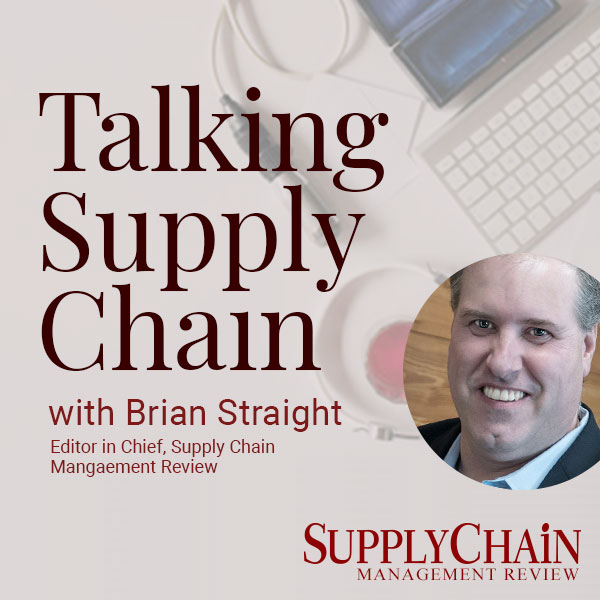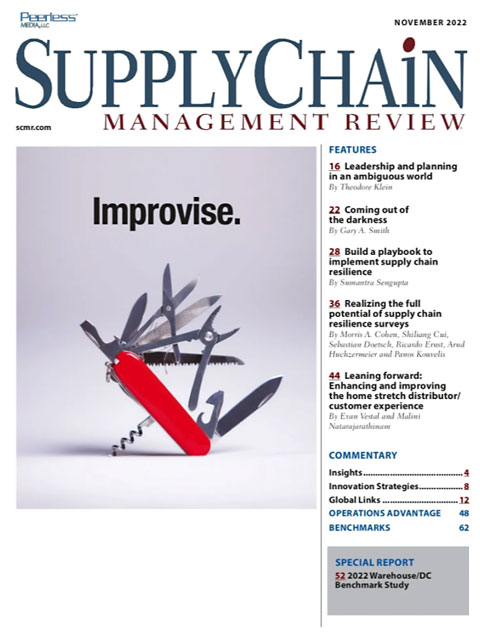Sorry, but your login has failed. Please recheck your login information and resubmit. If your subscription has expired, renew here.
November 2022
Are you resilient? It’s not an idle question. If there’s one word that I’ve heard at every supply chain event I’ve attended this year, its resilience. It is, of course, in response to the last few years in supply chain management. I think its fair to say that supply chains have been knocked to the canvas more times than Rocky. What has become clear as we do our post-pandemic reviews is that the firms that demonstrated the ability to get up off the canvas and keep punching were those that invested in resiliency before the pandemic—even if they didn’t use that term. Browse this issue archive.Need Help? Contact customer service 847-559-7581 More options
Market awareness of supply chain management has never been higher or less understood. Global geo-political and macroeconomic ecosystem conditions, regulations and disruptions are challenging every aspect of supply network complexity, from sourcing to final mile delivery and everything in between. Senior executives are facing operating model changes as they try to manage the risks and opportunities that lie on the path to profitable sustainability.
Emerging rules and regulations in supply chain are being introduced in the pursuit of sustainability. The Financial Stability Board’s (FSB) Task Force on Climate-related Financial Disclosures (TCFD) recommends organizations should assess not only the potential direct effects of climate change on their operations, but also the “potential second and third order effects on their supply and distribution chains.”
Mounting sustainability and regulatory pressures
Supply chain sustainability is the management of the environmental, social and economic impacts of an organization’s operations, and the encouragement of good governance practices throughout the lifecycle of goods and services.
The triple bottom-line of people, planet and profit shown in Figure 1 are respectively focused on social equity, environmental equity and economic equity, known collectively as ESG. Organizations must strive to operate within the intersection of these 3Ps in its pursuit for achieving profitable sustainable growth.

This complete article is available to subscribers only.
Log in now for full access or start your PLUS+ subscription for instant access.
SC
MR
Sorry, but your login has failed. Please recheck your login information and resubmit. If your subscription has expired, renew here.
November 2022
Are you resilient? It’s not an idle question. If there’s one word that I’ve heard at every supply chain event I’ve attended this year, its resilience. It is, of course, in response to the last few years in… Browse this issue archive. Access your online digital edition. Download a PDF file of the November 2022 issue.Market awareness of supply chain management has never been higher or less understood. Global geo-political and macroeconomic ecosystem conditions, regulations and disruptions are challenging every aspect of supply network complexity, from sourcing to final mile delivery and everything in between. Senior executives are facing operating model changes as they try to manage the risks and opportunities that lie on the path to profitable sustainability.
Emerging rules and regulations in supply chain are being introduced in the pursuit of sustainability. The Financial Stability Board’s (FSB) Task Force on Climate-related Financial Disclosures (TCFD) recommends organizations should assess not only the potential direct effects of climate change on their operations, but also the “potential second and third order effects on their supply and distribution chains.”
Mounting sustainability and regulatory pressures
Supply chain sustainability is the management of the environmental, social and economic impacts of an organization’s operations, and the encouragement of good governance practices throughout the lifecycle of goods and services.
The triple bottom-line of people, planet and profit shown in Figure 1 are respectively focused on social equity, environmental equity and economic equity, known collectively as ESG. Organizations must strive to operate within the intersection of these 3Ps in its pursuit for achieving profitable sustainable growth.
SC
MR


Latest Supply Chain News
- Few executives believe their supply chains can respond quickly to disruptions
- Technology’s role in mending supply chain fragility after recent disruptions
- Tech investments bring revenue increases, survey finds
- Survey reveals strategies for addressing supply chain, logistics labor shortages
- Israel, Ukraine aid package to increase pressure on aerospace and defense supply chains
- More News
Latest Podcast

 Explore
Explore
Software & Technology News
- Technology’s role in mending supply chain fragility after recent disruptions
- Tech investments bring revenue increases, survey finds
- Survey reveals strategies for addressing supply chain, logistics labor shortages
- AI, virtual reality is bringing experiential learning into the modern age
- Humanoid robots’ place in an intralogistics smart robot strategy
- Tips for CIOs to overcome technology talent acquisition troubles
- More Software & Technology
Latest Software & Technology Resources

Subscribe

Supply Chain Management Review delivers the best industry content.

Editors’ Picks






